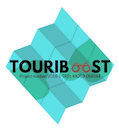IO 2
LINKING STAKEHOLDER EDUCATION TO KEY TOURISM EXPERIENCES AND QUALITY SERVICES IN THE TERRITORY
From December 2018 to September 2019
TASK 1: MOOC TRAINING COURSE
Recent Advances in ICT and mobile technology challenge the current educational models by transforming teaching and learning practice with new tools for knowledge acquisition. A hybrid learning methodology enables tourism professionals to manage information, exchange data, visualize trends and connect to social media tools providing full transparency in Project development and achievements in a Web 3.0 environment (the creation of high-quality content and services produced by gifted individuals using Web 2.0 technology as an enabling platform).
The e-Course assumes that: specific factors that are responsible for learning disabilities; learning material should be designed in a manner that accords and not conflicts with human cognitive architecture; the instructional designs and procedures are intended to working memory fatigue and render learning into pleasure generating procedure.
The e-Course is a MOOC skills development Course; it has duration of 6M and will be further supported with training in situ in IO3 via 4 transnational onsite field trips and training workshops. Respecting principles of Human Cognitive Architecture, the instructional design, is interlinked with 4 transnational training activities involved with know-how transfer and the design of 6 local Attraction Plans in IO3. The e-Course is supported by a Mediathek connected to IO1& 3, a collection of media material produced across the Project life, which facilitates domain specific knowledge acquisition and transfer in HE settings. It works as an indicator of trends, problems, solutions and deviations. It detects new potential services/products since media materials can be generated and uploaded in real-time using the local ICT access points the learners utilize.
MOOC platform
The e-Course has a duration of 6 weeks and precedes IO3 training, which further supports with 4 onsite field trips and training workshops
1: The Heritage Tourism Industry; 2: Attraction Planning (M8); 3: Cultural Communication (18); 5: Experience Design. The 4 Teaching Modules are specifically designed to reduce intrinsic cognitive load and to support self-directed-learning. Each cognitive module includes a short description of previous knowledge required, a short description of expected results (what is communicated to trainees), which are the basic elements of each module and why they are prerequisites to the next one. The logical coherence of the study material and the justification of each Module are also to be communicated to learners. Each Module presents in key words knowledge transferred, development of domain specific skill and the creation of products and services with an affinity to the sector of culture and tourism planning.
Facilitates domain specific knowledge acquisition and transfer in vocational learner settings. It is the collection of media material produced across the Project Life. It works as an indicator of trends, problems, solutions, deviations, new potential services and products since media materials can be generated and uploaded in almost real-time using the local ICT access points provided by the project. 15 Project activities (IO:6;IO3:4;Multiplier Events:5) generate video information, so that access to instant feedback is ensured for final users on any prototype developed.
9 academically sound and praxis validated pilot project planning tools shall facilitate the Partnership understand the process of the design and delivery of a high added value visitor experience at heritage places.
- Project Scope and Mission Tool
- Stakeholder Development Tool
- A The Audience Development Tool
- The Heritage Significance Assessment Tool
- Content Management Tool
- The Lay-Out and Graphic Design Tool
- The Storytelling & Plot Tool
- The Asset Planning Standard Form
- The Evaluation and Checklist Tool
Responsible partners
The PC designs the Training Platform for the MOOC and hosts the Training Platform. Each Partner participates the e-Course with a minimum of 3 participants, while it stays open to learners/students/stakeholders, who are admissible given the good command of English language.
The PC (NEU) and PP3 (KJF) make available 4 persons staff/experts to tutor the 6Month Course and cooperate closely to fine tune tasks and questions. PP6(ARTIFACTORY) delivers the instructional design methodology (TUTOR HANDBOOK) for the transnational trainers; the 4 Modules and the Attraction Design Tool. The PC(NEU) and PP3 (KJF) operate the e-Course and supervise the 6 dissertations of the trainees which correspond to the 6 Local Attraction Plans (IO3).
All partners cooperate to collect AV materials from the 6 Local Stakeholder Workshops, the 4 Transnational Onsite Training Activities and the 5 Multiplier Events to feed back the MOOC with news insights and first hand experiences.
